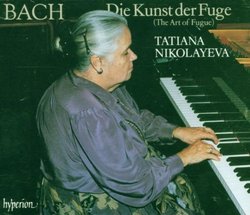| All Artists: Johann Sebastian Bach, Tatiana Nikolayeva Title: Bach: Die Kunst der Fugue Members Wishing: 1 Total Copies: 0 Label: Hyperion UK Release Date: 11/23/1993 Album Type: Import Genre: Classical Styles: Chamber Music, Forms & Genres, Improvisation, Historical Periods, Baroque (c.1600-1750), Modern, 20th, & 21st Century Number of Discs: 2 SwapaCD Credits: 2 UPC: 034571166315 |
Search - Johann Sebastian Bach, Tatiana Nikolayeva :: Bach: Die Kunst der Fugue
 | Johann Sebastian Bach, Tatiana Nikolayeva Bach: Die Kunst der Fugue Genre: Classical
|
Larger Image |
CD Details |
CD ReviewsBest of the best Dr. Gershom Martin | Rechovot Israel | 05/08/2005 (5 out of 5 stars) "I own about a dozen performances of The Art of Fugue (ranging from solo piano and organ over string quartet to Hermann Scherchen's orchestral arrangement). This is hands down my favorite (Scherchen's a distant second). Glenn Gould's might have been equally good if he had ever recorded the whole set for piano. (He recorded a partial set for organ, and piano recordings of a few individual fugues were released posthumously.) While Bach never specified instruments for TAoF, the voice leading is too keyboard-friendly to be coincidental. It is not a "flashy" work but --- despite that --- extremely demanding on a keyboard player in that exceptional articulation skills are required to clearly bring out the four voices. The purist may be annoyed at the fact that a piano (rather than a harpsichord) is used at all, and that (obviously) modern A=440 tuning is used. If you are one of these, you may wish to consider Davitt Moroney's harpsichord recording instead. Unlike Moroney and organist Helmut Walcha, Ms. Nikolayeva does not attempt to "complete" the final unfinished fugue: her playing tapers off on the last notes in the manuscript. The playing is not only crisp and technically perfect but beautiful at all times, and the recording very clean. Bonuses are the four Duets (which work surprisingly well on the piano) and the two Ricercars from The Musical Offering. (The Ricercar a 3, incredibly, is actually rooted in an improvisation session by Bach on an early Silbermann fortepiano at the palace of Frederick II in Potsdam.)" Exactly What I Expected Snow Leopard | Urbana, IL | 06/19/2001 (5 out of 5 stars) "Supposedly at an International Bach Competition (which Shostakovich was adjudicating and from which he would return to the Soviet Union, inspired by Nikolayeva to write his monumental 24 Preludes & Fugues for her), the final phase of the competition consisted of playing one of the fugues from the Art of the Fugue. When the panel asked Nikolayeva which one she intended to play, she responded, "Which would you like?" Needless to say, she won.Those who have never heard Nikolayeva's interpretations of Bach, even those who believe that Gould is the end-all be-all of all piano Bach, are truly missing an amazing thing. And I say this as an intense appreciator of Gould; I will take Nikolayeva over him on almost every score. (If you have the good luck to find her recordings of the Inventions and Sinfonias, start your comparisons to all others there). But here, with the Art of the Fugue, you have Nikolayeva revisiting a work with which she is mind-bogglingly in tune with. Her performances, and her overall approach to this most monumental epic of fugal composition, is exactly what I expected: sheer bliss." Elegant, magisterial Avid Reader | Franklin, Tn | 02/05/2004 (5 out of 5 stars) "I had the same initial reaction to this CD as I did to the recording by the same artist of the Shostakovich prelude and fugues. On the former I was put off by the idea of fugues from the Russian school. In this case, it was the idea of hearing the works on the piano. But Nikolayeva so completely won me over on the Shostakovich that I took the plunge.As other reviewers have noted, the crystal clarity of the notes, the phrasing and inner melodies, the structural soundness - all are perfect. In fact, The Art of the Fugue should be heard from several different media - organ, orchestral, piano, string quartet. POwerful work and a great job."
|

 Track Listings (15) - Disc #1
Track Listings (15) - Disc #1